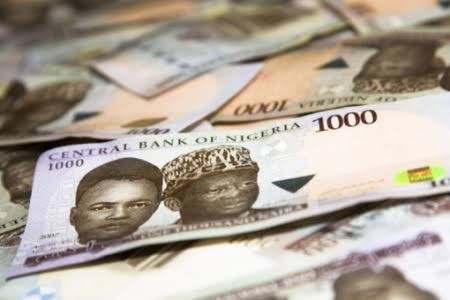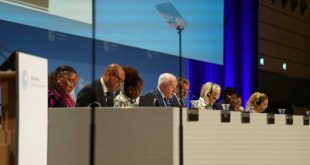
By Kingsley Moghalu
The naira needs to be floated to search out its change charge worth in the marketplace if Nigeria’s economic system is to change into productive, as a substitute of counting on oil revenues, a dependency that has plunged our nation and our residents deeper and deeper into fiscal chapter and particular person poverty. Ending the elusive quest for a “robust” foreign money when the financial fundamentals don’t help will probably be painful within the quick run (we’ve already undergone a number of years of devaluations pressured by these fundamentals, so what’s new?) however can be useful in the long term.
The notion of an artificially robust foreign money stays engaging for 3 elementary causes:
1. We’re essentially an import economic system, and imports are priced in dollars and different “reserve” currencies in worldwide commerce.
2. There’s a lack of financial data each in policy-making governance circles and within the wider inhabitants.
three. Based mostly on the 2 components earlier cited, politicians need to stay “standard” and lack the political will to do what’s required to set the economic system on a really productive path. Some “technocrats”, for self-serving causes, sing and clap alongside as a substitute of offering the required recommendation and steering.
In taking this method, in addition to others similar to subsidies on consumption as a substitute of on manufacturing, structural poverty has been entrenched in Nigeria and the Nigerian economic system has remained uncompetitive in a worldwide context, for a lot too lengthy.
To measure the naira solely relative to the greenback and different foreign currency is to overlook a fantastic level – that it issues as properly to distinguish what the naira equal of 1 greenback should buy in Nigeria from what one greenback should buy in America-what economists name “buying energy parity” – what your foreign money should buy for you in your nationwide market as a approach to measure GDP and GDP per capita. This method to measuring economies arose as a result of typically currencies are manipulated, and so measuring in opposition to such currencies might not yield a completely correct image. As somebody so brilliantly put it on a WHatsapp put up I learn, “within the US, a greenback might not purchase you greater than a bottle of water, whereas N500 will purchase you a pack of 12 of the identical bottles of water in Nigeria!”
As a result of we’re an import economic system, we need to preserve an artificially robust naira/greenback change charge, to subsidize the import behavior of our elite, or our potential to pay faculty charges of our wards overseas – comprehensible, given the decline of schooling in Nigeria, however not the answer to an issue that must be mounted.
We produce and export nothing that’s value-added. Over 90% of our foreign exchange comes from oil. When an economic system lacks “complexity” (value-added manufacturing as a ratio of GDP) however is dependent upon exports of pure commodities or minerals, the change charge worth of its foreign money is decided nearly completely by the extent of its international reserves, which accrues primarily from earnings from such commodity or useful resource exports. These reserves decide what number of months of imports such a rustic will pay for.
So when oil costs are excessive for an extended interval, the reserves swell, and the (say) naira worth relative to foreign currency rises. When the oil worth crashes, our reserves are depleted. When reserve ranges point out that a nation’s potential to pay for as much as six imports is threatened, market forces weaken the power of the foreign money (naira on this occasion). The worth of the foreign money crashes, as a result of that worth will not be underpinned by diversified exports that earn revenues as is the case with mature economies. If oil had been $100 per barrel for an extended interval, for instance, and our reserves rose to $80 billion, the naira worth relative to the greenback will go up. However we’ve little management over the vagaries of the oil worth.
Commodity dependence due to this fact exposes a rustic to foreign money instability besides the nation builds up large reserves (eg Saudi Arabia and the Gulf international locations which way back invested closely in oil refining AND have large sovereign wealth funds (we arrived on the sovereign wealth celebration about 40 years late!) along with exporting crude. It’s OBVIOUS in such instances that there’s backing for that authorized tender in phrases which can be related internationally. The naira will not be so lucky as a result of our economic system is “bare” and globally uncompetitive.
What all this implies is that the Central Financial institution of Nigeria’s efforts to “defend” the naira are like Sisyphus rolling the proverbial large boulder up the hill, just for it to certainly come rolling again down, economically talking. It weakens the very worth of the naira it’s defending as a result of the greenback provides come from the exterior reserves, however is politically “expedient” as a result of it creates an impression of patriotic nationalism. By the tip of the primary quarter of 2020, for instance, the Financial institution is reported to have spent roughly $four billion on naira Defence within the foreign exchange market by supplying the market with dollars.
Nevertheless it’s all simply populism. International buyers have exited, and foreign exchange will not be coming in as investments aren’t at a degree that may create confidence.
So the one approach to reposition our economic system is to shift it from an import-oriented one to at least one that’s export-oriented. For so long as CBN continues to subsidize the worth of the naira this is not going to occur, as a result of they’re creating incentives for an import orientation.
Foreign exchange “ban” makes the matter worse. Native productiveness typically will not be sufficient to satisfy the hole in demand for the beforehand imported merchandise. Smuggling booms. In the meantime, in a frontier economic system, “cabals” have reportedly had entry to the naira at CBN charges, in order that they get hold of large quantities of backed dollars, and switch round to promote the dollars on the avenue market charges with large earnings. Arbitrage reigns. The black market booms.
But when CBN devalues the naira decisively quite than tentatively, or permits it discover its worth out there, this may create an incentive to fabricate domestically and EXPORT with the intention to earn foreign exchange. As a result of imports change into costlier.
However different insurance policies should accompany this method. The absence of these insurance policies is why collection of devaluations haven’t solved the issues, however solely import inflation. That is loss of life by a thousand cuts.
The required accompanying coverage thrust is commerce coverage. As an alternative of foreign exchange bans, anybody ought to be capable of import (sure, they may want foreign exchange to take action)however slap excessive tariffs (revenues for the federal government!) on imports deemed luxurious objects. Coverage help needs to be supplied to allow native manufacturing of such items to be cheaper than international imports. That approach, wealthy folks should buy costly imported items, poorer folks should buy cheaper “local-made”. Extra exports, extra foreign exchange, and ultimately the worth of the naira stabilizes. The “low cost” change charge of the naira (from the attitude of international commerce companions) will result in larger orders of Nigerian manufactures, which = extra foreign exchange earnings. International buyers looking for revenue may also flood the nation that’s seen as a big and worthwhile market with dollars as a result of the market is “open” and commerce clear. This may also assist stabilize the naira.
However that is troublesome when Nigeria is being mortgaged to a rustic like China. If our authorities treats China as a monetary lifeline, can we slap the suitable tariffs on imports from China that are so cheaply produced that it makes manufacturing in Nigeria uncompetitive? That is a part of a broader drawback of the absence of a worldview that features a technique to rise on the earth, together with economically.
Ideally, residents needs to be properly ready, communicated to and educated about these sorts of mandatory reforms. And we all know that vested pursuits will typically search to short-circuit such reforms to nonetheless sport the system. It’s like freeway theft on an unsafe street. You could be OK within the early a part of the journey, however might (God forbid) run into robbers within the final mile. The position of vested-interest rent-seeking in Nigeria’s economic system has been a dominant one for a lot too lengthy. The phenomenon will not be distinctive to Nigeria, however that’s no excuse. Our concern is about our nation and our folks and creating an enabling setting for actual improvement. Getting proper the steadiness betweeen the position of the state and that of markets is without doubt one of the most necessary components in improvement. I hope that, as President Muhammadu Buhari pursues the Imaginative and prescient 2050, we are able to get these fundamentals proper.
 Top Naija News – Nigeria News, Nigerian News & Top Stories Top Naija News – Nigerian Newspapers, Nigerian News. topnaijanews is a daily Nigerian newspaper covering Latest News, Breaking News, Entertainment, Sports, Lifestyle and Politics.
Top Naija News – Nigeria News, Nigerian News & Top Stories Top Naija News – Nigerian Newspapers, Nigerian News. topnaijanews is a daily Nigerian newspaper covering Latest News, Breaking News, Entertainment, Sports, Lifestyle and Politics.




